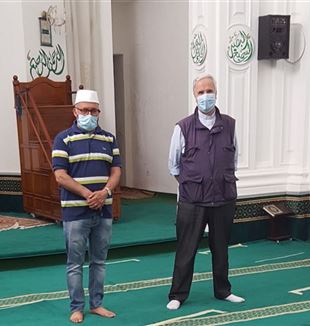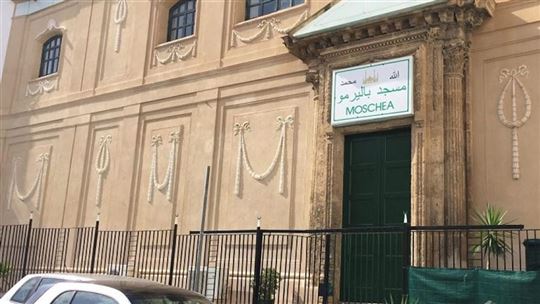
Italy: A tête-à-tête between the priest and the imam
A meeting between Fr. Carmelo, a priest in Palermo, Sicily, and Mustafà Boulaalam, Imam of a mosque in the city. To look together at what has happened in their communities, starting from God’s tireless companionship to all men.Among the many nicknames attributed to Covid-19 is that of "the democratic virus", because it spared nothing and no one. Catholics have had to close churches and oratories, but the Islamic community has also had to withstand heavy restrictions.
A few days ago, in Palermo, Fr. Carmelo Vicari, parish priest of Sant'Ernesto, visited Mustafà Boulaalam, Imam of the mosque in Piazza Gran Cancelliere. It was a cordial and fraternal meeting, fruit of a friendship that has lasted a long time, to exchange experiences and stories of what the Islamic and Catholic communities have experienced during the pandemic.
The Imam immediately accompanied Fr. Carmelo to the mosque, showing him the changes made to comply with safety regulations: "During the first weeks of isolation,” he explained, “we transformed this room into a storage room for the food that was donated to us by the Food Bank, for the families we help. Now it has been converted back to a place of prayer, but we have had to restrict access." "The same happened in my parish,” said Fr. Carmelo: "We had to allow the faithful to come to the church in absolute safety." Prayer shifts for the Muslims, changes in the way of celebrating Mass for Christians, the use of technology…As Mustafà recounted: "I sent around the text of the sermon every week, via internet, to gather families to pray together at home, going beyond the Islamic tradition that does not provide for common prayer for men and women." "The web has also been widely used in my parish,” Vicari replied: "We not only guaranteed relations with parishioners, but we "entered" many houses. Many people have "discovered" the parish through the catechism of children or the daily broadcast of Mass."
In these months, the Church has celebrated Lent and Easter, whilst Islam has celebrated Ramadan, important moments for both religions. For the Imam, "it was different from other years, but not less. We all spent more time at home, particularly dedicating time to the young, but we did not renounce the daytime fasting or the evening meal where the whole family gathers, nor the gestures of fraternal charity that are required on this occasion." And Fr. Carmelo said: "The impossibility of coming to church for months and not being able to take the Eucharist has been a hard test that has confronted everyone with the need to understand its importance."
There was also talk of the economic crisis and of the poor. "From the beginning, we have helped both the families we habitually help and others who have joined in," explained Vicari: "A race of solidarity has begun among the parishioners who have given their money and time." The initiative "Portofranco adopts a family", for example, arose from a group of teachers who until two months before had run an afterschool group every afternoon and who had organised a petition thanks to the help of volunteers and an agreement with a supermarket. There was also a fundraising event in order to donate a latest-generation breathing ventilator to the Vincenzo Cervello hospital.”
"Our community has also suffered," replied the Imam: "Many have lost their precarious or underpaid work with which they supported their families, often with many children. And the Food Bank has helped us. But even now the emergency is not over."
During the meeting, Fr. Carmelo looked several times at an Arabic inscription on a wall of the mosque. "The last two Surahs of the Qu’ran," Mustafà explained: "In both there is a reference to the evil that manifests itself in the relationship between man and God. Its goal is to distance man from God. In Islamic tradition, prayer takes place with an almost physical contact between the faithful, precisely so that the Evil One does not find space." Words that immediately recalled current events: themes such as social distancing, prophylaxis... "These measures must be respected. But it is necessary to explain them, because they touch important aspects of the life of a people. Rules and principles can change over the centuries. But it must be clear that this does not happen arbitrarily or whimsically. At the same time, you have to be accountable to the tradition of a community."
"Many, however, think that some gestures are only exterior and formal, devoid of meaning,” said Fr. Carmelo. And Mustafà replied: "Sure, it can happen. But it is important that the faithful have a clear understanding of the meaning of every gesture or rite in any religion. If for any reason we lose the meaning, then a gesture becomes empty and the devil has won its battle."
Struck, Fr. Carmelo replied: "The experience of Coronavirus has been and is a great provocation for our tradition as well. Small gestures like the exchange of peace or holding hands to recite the Lord's Prayer... One can temporarily give up without forgetting its importance and meaning. The most serious thing would be to not do it again when everything is over, because we have become accustomed to doing without. This would mean that they did not make sense before either.”
Read also – “A festival of humanity”
At the end of the meeting, Mustafà accompanied Fr. Carmelo to the door and said goodbye with these words: "For us too it has been a matter of accepting these novelties that have been imposed upon us, and that have already changed us. But as we have verified so far, God is great and merciful and He will not allow us to miss His companionship."